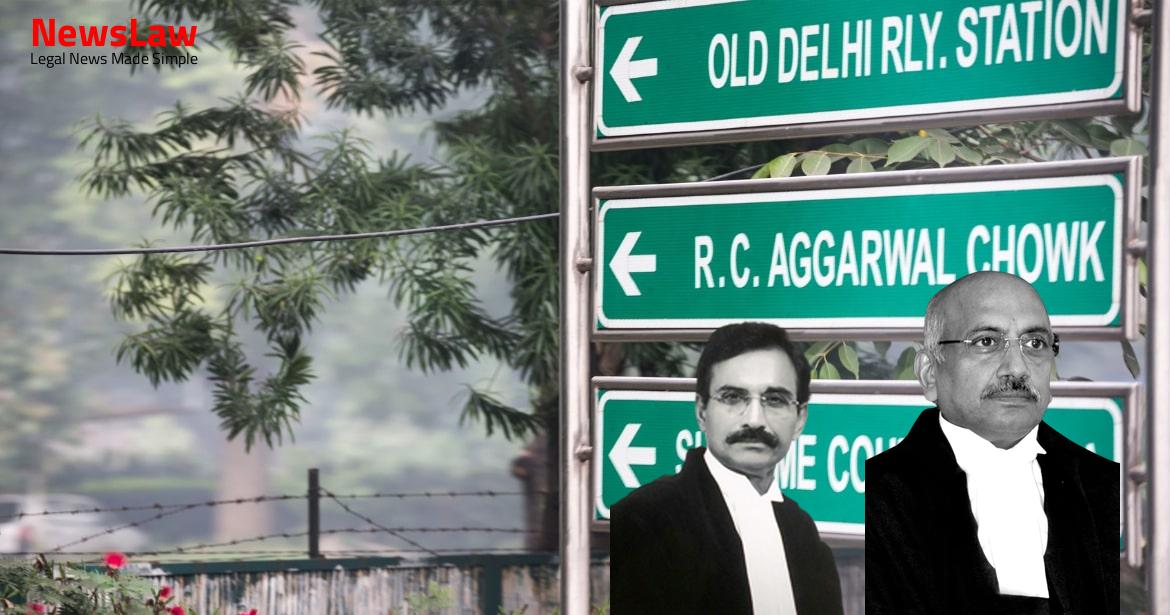In a significant legal development, the Supreme Court of India has reached a pivotal decision concerning the conviction under Section 498A IPC. This ruling carries immense weight in the realm of justice and law, ensuring accountability and setting a precedent for future cases. Stay tuned for more insights on this landmark judgement.
Facts
- PW-12 and PW-10 did not mention any demand of dowry by the Appellant.
- PW-11 testified that the deceased was harassed by the Appellant for dowry.
- The deceased Moniya expressed distress over Appellant’s behavior and extra-marital relations.
- Suicide note seized did not mention dowry demand but indicated troubled relationships.
- Appellant convicted under Section 498A and 306 IPC based on evidence.
- Statements of family members and post-mortem report support the harassment claims.
- Inquest conducted by Executive Magistrate, FIR registered on mother’s statement.
- Several witnesses and documents used to establish guilt of the Appellant.
- Appellant’s conviction based on testimonies and circumstantial evidence.
- The Appellant was acquitted for the offence under Section 306 IPC due to lack of evidence of mental or physical cruelty towards the deceased.
- The High Court acquitted the Appellant under Section 306 IPC but upheld the conviction under Section 498A IPC.
- The main issue considered by the High Court was the correctness of the conviction under Section 306 IPC without a specific charge being framed.
- The Appellant’s appeal was partly allowed by the High Court with regards to the conviction under Section 306 IPC.
- The Trial Court found the Appellant guilty of mental cruelty and convicted him under Section 498A IPC.
- The High Court affirmed the conviction under Section 498A IPC based on evidence of dowry demand.
- The acquittal of the Appellant under Section 306 IPC remained final as no appeal was filed by the State.
- The Trial Court accepted oral evidence of the Appellant informing the deceased about his extramarital relations.
- However, the Trial Court did not find convincing evidence to hold the Appellant guilty of abetting the deceased’s suicide.
- The Trial Court convicted the Appellant under Section 498A IPC but did not find the demand of dowry to be proved.
Also Read: Supreme Court Ruling on Dowry Harassment and Suicide Case
Arguments
- The Appellant had already undergone the sentence under Section 498A IPC.
- The Trial Court’s conviction under Section 498A was based on mental cruelty and not for demand of dowry.
- The High Court acquitted the Appellant under Section 306 IPC as the charge of abetment of suicide was not proved.
- The State argued that there was evidence of dowry demand by the Appellant based on family members’ statements.
Also Read: Case of Technical Equipment Officer Appointment Criteria Dispute
Analysis
- Conviction under Section 498A IPC can be for wilful conduct likely to drive a woman to commit suicide or for dowry demand.
- Cruelty includes conduct likely to drive a woman to commit suicide or cause grave injury.
- Harassment through unlawful dowry demand is also considered cruelty.
- Clear mens rea needed for conviction under Section 306 IPC for abetment of suicide.
- Punishment under Section 306 IPC can extend to ten years.
- High Court made a decision under Section 498A without discussing dowry demand evidence.
- Explanation to Section 498A defines ‘cruelty’ including conduct leading to suicide or grave harm.
- Direct act intended to lead to suicide is necessary for abetment.
- Accused’s intention to aid or instigate suicide must be present for abetment.
- No evidence of dowry demand found by the Trial Court.
- Appellant convicted under Section 498A IPC for wilful conduct leading to suicide.
- Judgement focuses on the Appellant’s conduct and its impact on the deceased.
- The High Court should not have convicted the Appellant under Section 498A without discussing the evidence on record.
- The Trial Court found no material on record to show any demand of dowry.
- The High Court did not mention the findings of the Trial Court and did not provide reasons for disagreeing with it.
- The judgment of the High Court is set aside due to lack of detailed discussion and reasons.
- The High Court found no proof of mental or physical cruelty on the part of the Appellant.
- The conviction under Section 498A IPC is not based on wilful conduct leading to suicide.
Also Read: Supreme Court Judgement on Transfer of Mining Environmental Clearances
Case Title: WASIM Vs. STATE NCT OF DELHI
Case Number: Crl.A. No.-001061-001061 / 2019



